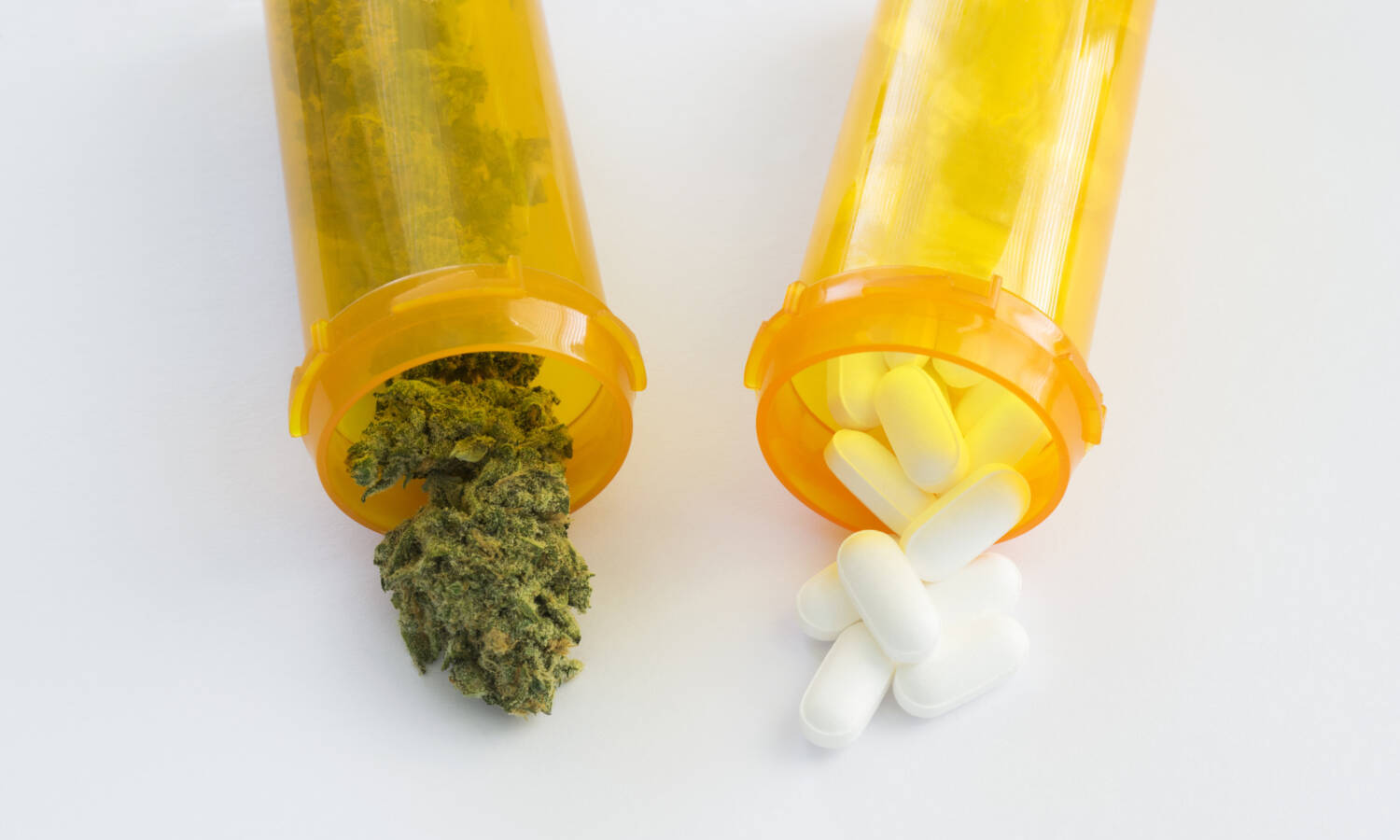Healthcare
Drugs You Don’t Want To Mix With Marijuana

Here is a list of medications and conditions that are currently thought to have adverse effects when mixed with cannabis.
Marijuana is considered a relatively safe drug, and as time passes medical professionals are finding more and more uses for it as a medicine. From helping those with multiple sclerosis to an FDA approved medical derived from cannabis to treat epilepsy, cannabis is finding its footing and rooting itself firmly in the medical community.
Still, just like with nearly every substance we put in our bodies, there are certain medicines that just don’t mix well with marijuana. What’s more is that while marijuana can have often-desirable effects, these effects can sometimes be dire those with certain medical conditions.
Testing and research is limited, as marijuana is still illegal on a federal level. However, here is a list of medications and conditions that are currently thought to have adverse effects when mixed with cannabis.
Opioids and Sedatives
Opioids and sedatives come with their own risks even when they are not combined with other substances. When they are combined with marijuana, however, their effects can be heightened and amplified, which can be dangerous for those who combine these substances.
“Marijuana’s biggest-known impact is with opioids (for pain), sleep medications, muscle relaxants and alcohol because all affect the central nervous system,” according to Salem Health, which also mentions that when marijuana is used with sedatives and hypnotics it can have an addictive effect.
It is important to be up front and honest with your physician if you are prescribed opioids or sedatives but also want to use marijuana for recreational or medical purposes. At the very least, your physician can recommend some drugs over others or suggest a dosage that will not put your health at risk.

Blood Thinners
Marijuana and blood thinners are another potentially dangerous combination. Marijuana can cause blood thinners to work excessively well, which can have dangerous consequences. “Marijuana can increase the levels of the blood thinner warfarin in the body, which can lead to excessive bleeding,” according to NBC News. Marijuana combined with certain blood thinners can thin your blood out to dangerous levels, so it is imperative you know whether or not the blood thinning drugs you are taking might be affected by marijuana use.
Even if the drugs may not cause severe side effects like excess bleeding, they may otherwise change the drugs effectiveness. ”Using marijuana while on a statin or a blood thinner can change how these drugs work in the body,” lead author Dr. Muthiah Vaduganathan, a cardiologist at the Brigham and Women’s Hospital in Boston, told NBC News.
Anxiety or Depression Medication (SSRIs & Benzodiazepines)
Another group of drugs that can have negative and even dangerous consequences when mixed with marijuana are medications meant to treat anxiety and depression. More specifically, SSRIs (like Cipralex or Prozac) and also Benzodiazepines (like Xanax or Valium) can both have adverse effects when mixed with marijuana.
One reason it is a bad idea to mix these drugs with marijuana is that both types of drug are mood altering. “The challenge for people who have mood disorder or depression is that every time they’re using cannabis, they’re taking another psychoactive drug,” Dr. Timothy Brennan, director of the Addiction Institute at Mount Sinai West and Mount Sinai St. Luke’s Hospitals, told Women’s Health. “And that can make it very challenging for a patient or physician to figure out what drug is actually having an effect on what,” Brennan continued.
This also means that marijuana can potentially negate the positive effects these mood and anxiety medications are having.

Tamoxifen
While medical marijuana is often prescribed to cancer patients undergoing treatment, one medication in particular should never be taken with marijuana. Tamoxifen, which is one drug used to combat breast cancer, may have its benefits negated when combined with marijuana. “If pot interferes with the processing of tamoxifen, it could cause the breast cancer patient to receive little to no benefit from the drug,” Philip Lazarus, a professor of pharmaceutical sciences at Washington State University, told WebMD. This should be a sobering reminder to always consult your physician about your cannabis use when you are on any type of life saving or critical medication.
Continued Challenges With a Lack of Research
While the medications we listed above could be dangerous or pose risks when mixed with marijuana, there still needs to be more research conducted. Unfortunately, even though (as we’ve reported) more people now smoke marijuana than cigarettes in this country, there have been limited trials on how pharmaceuticals interact with marijuana.
“So even while many people may use marijuana, tight federal restrictions limit researchers’ ability to study cannabis as approved medications are typically studied, including evaluating whether it can safely be taken with medications,” according to U.S. News. This is one strong argument as to why there needs to be a reclassification of marijuana. Taking marijuana off the Schedule I drug list would allow for significantly more research on the substance, and would improve how we understand the ways it interacts with other substances in our body.
Source: https://thefreshtoast.com/cannabis/drugs-you-dont-want-to-mix-with-marijuana/
Business
New Mexico cannabis operator fined, loses license for alleged BioTrack fraud

New Mexico regulators fined a cannabis operator nearly $300,000 and revoked its license after the company allegedly created fake reports in the state’s traceability software.
The New Mexico Cannabis Control Division (CCD) accused marijuana manufacturer and retailer Golden Roots of 11 violations, according to Albuquerque Business First.
Golden Roots operates the The Cannabis Revolution Dispensary.
The majority of the violations are related to the Albuquerque company’s improper use of BioTrack, which has been New Mexico’s track-and-trace vendor since 2015.
The CCD alleges Golden Roots reported marijuana production only two months after it had received its vertically integrated license, according to Albuquerque Business First.
Because cannabis takes longer than two months to be cultivated, the CCD was suspicious of the report.
After inspecting the company’s premises, the CCD alleged Golden Roots reported cultivation, transportation and sales in BioTrack but wasn’t able to provide officers who inspected the site evidence that the operator was cultivating cannabis.
In April, the CCD revoked Golden Roots’ license and issued a $10,000 fine, according to the news outlet.
The company requested a hearing, which the regulator scheduled for Sept. 1.
At the hearing, the CCD testified that the company’s dried-cannabis weights in BioTrack were suspicious because they didn’t seem to accurately reflect how much weight marijuana loses as it dries.
Company employees also poorly accounted for why they were making adjustments in the system of up to 24 pounds of cannabis, making comments such as “bad” or “mistake” in the software, Albuquerque Business First reported.
Golden Roots was fined $298,972.05 – the amount regulators allege the company made selling products that weren’t properly accounted for in BioTrack.
The CCD has been cracking down on cannabis operators accused of selling products procured from out-of-state or not grown legally:
- Regulators alleged in August that Albuquerque dispensary Sawmill Sweet Leaf sold out-of-state products and didn’t have a license for extraction.
- Paradise Exotics Distro lost its license in July after regulators alleged the company sold products made in California.
Golden Roots was the first alleged rulebreaker in New Mexico to be asked to pay a large fine.
Source: https://mjbizdaily.com/new-mexico-cannabis-operator-fined-loses-license-for-alleged-biotrack-fraud/
Business
Alabama to make another attempt Dec. 1 to award medical cannabis licenses

Alabama regulators are targeting Dec. 1 to award the first batch of medical cannabis business licenses after the agency’s first two attempts were scrapped because of scoring errors and litigation.
The first licenses will be awarded to individual cultivators, delivery providers, processors, dispensaries and state testing labs, according to the Alabama Medical Cannabis Commission (AMCC).
Then, on Dec. 12, the AMCC will award licenses for vertically integrated operations, a designation set primarily for multistate operators.
Licenses are expected to be handed out 28 days after they have been awarded, so MMJ production could begin in early January, according to the Alabama Daily News.
That means MMJ products could be available for patients around early March, an AMCC spokesperson told the media outlet.
Regulators initially awarded 21 business licenses in June, only to void them after applicants alleged inconsistencies with how the applications were scored.
Then, in August, the state awarded 24 different licenses – 19 went to June recipients – only to reverse themselves again and scratch those licenses after spurned applicants filed lawsuits.
A state judge dismissed a lawsuit filed by Chicago-based MSO Verano Holdings Corp., but another lawsuit is pending.
Source: https://mjbizdaily.com/alabama-plans-to-award-medical-cannabis-licenses-dec-1/
Business
Pot Odor Does Not Justify Probable Cause for Vehicle Searches, Minnesota Court Affirms

The Minnesota Supreme Court affirmed that cannabis odor does not constitute probable cause to search a vehicle.
If Minnesota police search a vehicle solely based upon the smell of pot, they can’t justify searching a vehicle, even if there is evidence found of other alleged crimes. Even after appealing a lower court decision to suppress the evidence—twice—the Minnesota Supreme Court agreed, and the dismissal of his charges stands.
In a ruling filed regarding a case the State of Minnesota Court of Appeals on Sept. 13, the Minnesota Supreme Court affirmed that cannabis odor does not constitute probable cause to search a vehicle.
The case has been ongoing for two years. On July 5, 2021, just before 10 p.m., a Litchfield police officer stopped a car for an obscure local law: the light bar mounted on the vehicle’s grill had more auxiliary driving lights than are permitted under Minnesota law. The officer asked the driver, Adam Lloyd Torgerson, for his license and registration. Torgerson, his wife, and his child were present in the vehicle. The officer stated that he smelled pot and asked Torgerson if there was any reason for the odor, which he initially denied. But cops found a lot more than just pot.
A backup officer was called in. The couple denied possessing any pot, but Torgerson admitted to smoking weed in the past. The second officer stated that the weed odor gave them probable cause to search the vehicle and ordered them to exit the vehicle. The first officer searched the vehicle and found a film canister, three pipes, and a small plastic bag in the center console. The plastic bag contained a white powder and the film canister contained meth, which was confirmed in a field test.
Torgenson was charged with possession of meth pipe in the presence of a minor and fifth-degree possession of a controlled substance after the unwarranted search of Torgerson’s vehicle.
Police Aren’t Allowed to Do That, Multiple Courts Rule
But the search had one major problem—cops weren’t searching for a meth pipe. They only searched his car because they could smell pot, and the meth and paraphernalia were a surprise for everyone. Still, they had no grounds to search the vehicle. The man’s charges were later dismissed after the district court determined the odor of cannabis alone was insufficient basis for probable cause to search the vehicle, regardless of whatever other drug paraphernalia they found.
The state appealed the case, but the Minnesota Court of Appeals affirmed the district court’s decision. The case was appealed a second time, this time to the Minnesota Supreme Court, which agreed with the lower court’s ruling.
“This search was justified only by the odor of marijuana emanating from the vehicle,” the Minnesota Supreme Court decision reads. “Torgerson moved to suppress the evidence found during the search, arguing that the odor of marijuana, alone, is insufficient to create the requisite probable cause to search a vehicle under the automobile exception to the warrant requirement. The district court granted Torgerson’s motion, suppressed the evidence, and dismissed the complaint. The State appealed. The court of appeals affirmed the district court’s suppression order. Because we conclude that the odor of marijuana emanating from a vehicle, alone, is insufficient to create the requisite probable cause to search a vehicle under the automobile exception to the warrant requirement, we affirm.”
It amounts to basic human rights that apply—regardless of whether or not a person is addicted to drugs.
Other States do Precisely the Same Regarding Pot Odor as Probably Cause
An Illinois judge ruled in 2021 that the odor of cannabis is not sufficient grounds for police to search a vehicle without a warrant during a traffic stop.
Daniel J. Dalton, Associate Judge of the 14th Judicial Circuit, issued a ruling in response to a motion to suppress evidence in the case of Vincent Molina, a medical cannabis patient arrested for cannabis possession last year.
In that case, Molina was arrested despite the decriminalization of small amounts of cannabis in Illinois in 2019 with the passage of the Illinois Cannabis Regulation and Tax Act.
In some states, the issue of probable cause and cannabis was defined through bills.
Last April, the Maryland House of Delegates approved a bill that reduces the penalties for public cannabis consumption and bars police from using the odor of cannabis as the basis for the search of an individual or auto. Under Maryland’s House Bill 1071, law enforcement officers would be prohibited from using the odor of raw or burnt cannabis as probable cause to search a person or vehicle.
The rulings represent the rights of citizens when they are pulled over by police, even if there are hard drugs involved.
-

 Business2 years ago
Business2 years agoPot Odor Does Not Justify Probable Cause for Vehicle Searches, Minnesota Court Affirms
-

 Business2 years ago
Business2 years agoNew Mexico cannabis operator fined, loses license for alleged BioTrack fraud
-

 Business2 years ago
Business2 years agoAlabama to make another attempt Dec. 1 to award medical cannabis licenses
-

 Business2 years ago
Business2 years agoWashington State Pays Out $9.4 Million in Refunds Relating to Drug Convictions
-

 Business2 years ago
Business2 years agoMarijuana companies suing US attorney general in federal prohibition challenge
-

 Business2 years ago
Business2 years agoLegal Marijuana Handed A Nothing Burger From NY State
-

 Business2 years ago
Business2 years agoCan Cannabis Help Seasonal Depression
-

 Blogs2 years ago
Blogs2 years agoCannabis Art Is Flourishing On Etsy













